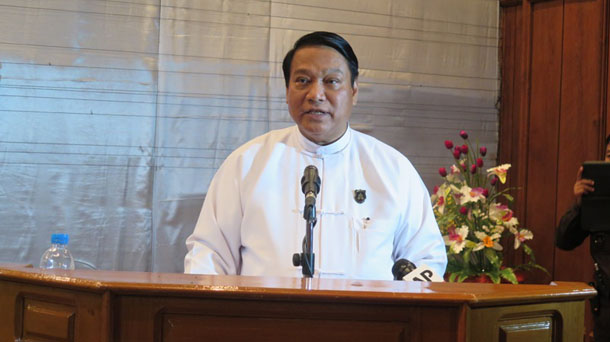RANGOON — The Burmese minister of immigration and population has denied that a recent outbreak of fighting Kachin State and northern Shan State is connected to efforts to collect census data in conflict areas.
In recent weeks thousands of people been added to the tens of thousands displaced by violence in northern Burma, with many linking the renewed clashes with an increase of security personnel in parts of the country where ethnic armed groups refused to cooperate with the census.
Khin Yi, the minister responsible for the United Nations-backed national census, held a press conference at the Rangoon Division Parliament on Wednesday, in which he attempted to explain the government’s efforts to collect data in conflict areas, as well as in Arakan State, where Muslims have been declined the right to self identify their ethnicity in the census.
“What is happening in Kachin is not because of census data collection,” said Khin Yi, when asked to comment on a news report that quoted President’s Office Minister Aung Min, the government’s chief peace negotiator, linking the fighting to the census-taking process.
“What Aung Min said might be misunderstood. We collect data only when we have permission for collection. We will continue to negotiate to collect in Kachin without giving up,” Khin Yi said.
The Kachin Independence Organization (KIO) refused to allow government census enumerators to collect data in areas it controls, as did the Ta’ang National Liberation Army, based in northern Shan State. Both groups, as well as the Shan State Army-North, have clashed with the Burma Army since government attacks on villages were reported over Burmese New Year in April.
Khin Yi also denied that enumerators had been accompanied by security forces while conducting the census in areas of disputed control, despite government-run media reporting that this was the case.
“We don’t collect census with security forces,” he said.
Khin Yi said the census was successfully conducted in almost all areas where ethnic armed groups are still active, with the exception of about 25 village tracts, consisting of 97 villages, in Kachin State. The KIO controls a section of the Burmese-Chinese border, and its territory includes camps for thousands of internally displaced persons.
The minister said he would continue making efforts to have the census fully completed in Kachin State, as well as in Arakan State, where many people were also not counted during the initial 12 days of data collection, which ended on April 10. He noted that under census rules, data can still be collected for six to eight weeks after the initial collection.
Despite saying ahead of the census that Muslims in Arakan State who call themselves Rohingya would be able to do so in the census, the government at the last minute declared that the term would not be allowed in the census. The government does not recognize Rohingya as an ethnic group and Muslims in Arakan State have been passed over by enumerators unless they agree to complete the census under the government’s preferred term, Bengali.
Khin Yi said there were in total about 1.33 million “Bengalis” in Burma and an estimated 300,000 people had been counted as such in the census. In Arakan State, he said, only 20,000 of the estimated 1.05 million “Bengali” population in the state had been included in the census.
“I will go to Arakan State on Friday and will discuss with stakeholders to recollect the census. I will try till the end of May,” Khin Yi said.
He said he would seek guarantees from the community that continued data collection will not cause conflicts, but said the government would still not allow people to call themselves Rohingya in the census.
Preliminary findings from manually counting the census forms will be released in August and include at least population data and gender data at a division and township level. Finalized population data is not set to be announced until May next year.

















